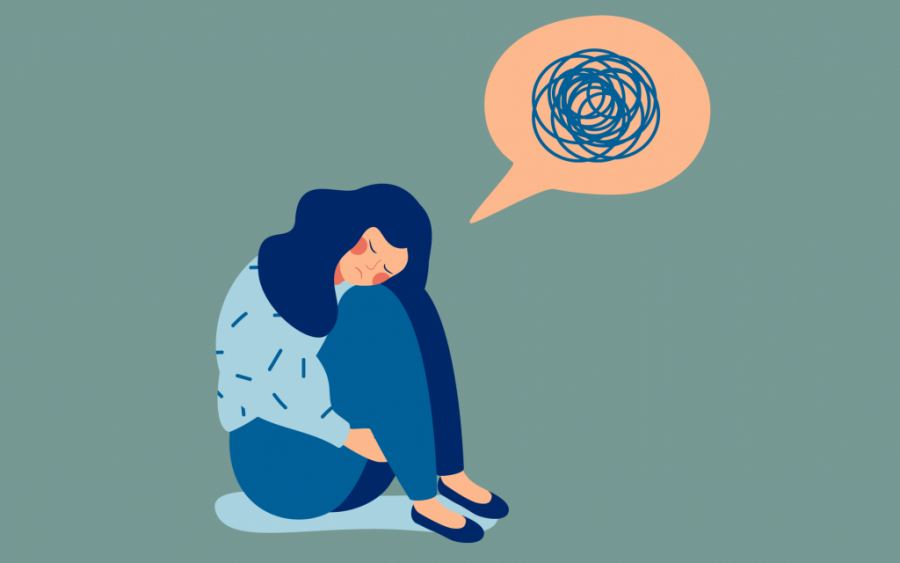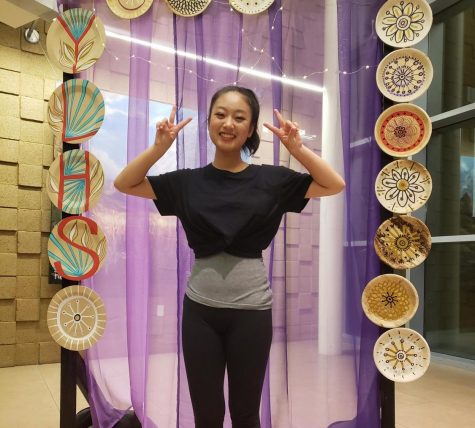Anxiety, How to Work and Cope With It
October 10, 2020
Anxiety is very prevalent among teens. According to the National Institutes of Health, nearly 1 in 3 adolescents between 13 and 18 will experience an anxiety disorder (healthychildren). With anxiety being one of the more frequent problems among teens, how can we cope with it and help others with it?
First, how do you know if you have an anxiety disorder since everyone naturally experiences anxiety at some point in their lives? The common symptoms are difficulty focusing, eating, sleeping, tendency to overthink, and constantly questioning yourself. However, anxiety is different for everybody so you cannot assume this person has or does not have anxiety just based on 1 or 2 symptoms. Mrs. Heim (staff) said that anxiety can be messages going through your head like “I am going to fail out of school” or “I will never enter college and will be homeless.” She calls it catastrophizing where people think of exaggerated thoughts that will most likely not happen. The advice Mrs. Heim gave is to think rationally since the brain is a powerful weapon and with willpower, everyone can calm down.
Especially for us students, we tend to experience anxiety in classes that are just overwhelmingly hard or cause stress. That can lead to many of us catastrophizing, calling ourselves stupid over not doing that good on a quiz or homework, and we end up thinking we will get kicked out of school just because we did not reach our standards. Just like in the previous paragraph, calm down and think rationally, give yourself standards that you know you can achieve, and try your best to reach them. There will always be days where you are not at your best, but don’t worry, you will always have another chance. Mrs. Heim said to give yourself some grace and not go too hard on yourself. She also recommended writing some encouraging sticky notes that include compliments like “You can do it!” and sticking them somewhere you will see them.
Another thing that has definitely caused anxiety for many of us is transitioning or a huge transformation or change, aka, this quarantine. With us not being able to go out that freely, many of us are stuck home in our rooms and not used to this unknown situation. This can cause thoughts like “what happens if this quarantine will never end” or “we will never get better.” Again, try thinking positive, and what I mean by positive is not ignorance but some hope. When sad, take some moments to calm down and make yourself happy. Mrs. Heim said that we are made to just wallow in our sadness, which is why we feel better listening to sad songs. She said instead people should listen to songs that are happy and encouraging, and always give yourself some encouragement or compliments!
Another helpful coping skill is to just breathe. Taking three big breaths can really help you calm down and to feel yourself breathe. When breathing, take a big breath through your nose and tilt your head upward, and when breathing out, breathe out through your mouth and tilt your head downward. Use words of affirmation, like “I can do this,” while breathing since the brain is very strong and can change your mood and thoughts. Mrs. Heim says she likes to imagine that she is breathing in some light through her nose and breathing out dark harmful things out of her mouth.
What happens if someone around me or I get a panic attack, what do we do? First of all, panic attacks are not something that is common, so if someone gets a panic attack, treat it seriously. If you are with someone who has a panic attack, they can all react differently. Some people cry and can’t breathe, others just shut down completely, some just curl up in a ball and mumble to themselves. Whatever their panic attack is, the important thing is to have them become aware that you are with them. First, move them to a safe place, some people get panic attacks because a place or something has triggered them, so move them somewhere safe. Grab their hand or face and squeeze it enough so they can feel that you’re touching them. It should work all the time as it snaps them out of their senses. Using cold water or gently putting ice on their face can snap them out of it too. Make sure to calm down and talk to the person too so they are aware you are there for them.
It may seem as if panic attacks have a pattern to them, but panic attacks can happen out of the blue. So let’s say you are alone, and for some reason, you have been triggered by something that usually never triggers you, what do you do at that moment? First go to a safe place, some people when having a panic attack cannot see due to the brain just shutting down. So try to calmly navigate yourself to a safe place. Encourage yourself and wash your face with cold water to “reset” the brain. It is important to find a place where you can calmly think rationally. One tip Mrs. Heim gave was when you feel anxious or nervous, pinch an area of the hand between the thumb and index finger, not too hard, but enough to feel yourself and to calm down. This is a good way to cope and think.
Also, an important announcement: coping isn’t something you are good at from the beginning. You get better the more you practice it, so even if it seems that it is not working at first, keep using coping tactics and you will eventually get better and better!
To clarify, Mrs. Heim said that anxiety doesn’t always lead to depression. Some people just become numb or apathetic, although usually anxiety and depression come hand in hand. She nicknamed them cousins since when a person has anxiety, sometimes depression comes along. So if you also have any self-harming thoughts, make sure to talk with a trusted adult or professional to help you.
Now then, how can we find help? Most people talk with friends and tell them about their anxiety. If you are uncomfortable telling your friend in that case, you should go to a trusted adult. In school, we have teachers and staff that are more than willing to help you. Some people go to parents, and there have been cases where kids have said that their family members don’t believe they have anxiety. In those cases, find ways to cope and you can still go to a trusted adult at school to help you. If the issue does not go away, that is when you need to seek professional help.
If you want to see Mrs. Heim, she has stated you want to first check-in with your guidance counselor. According to your last name, you can either have Mrs. Walls, Mrs. Pike, and Mrs. Coulter. They will decide if you need to see Mrs. Heim or not. On Mrs. Heim’s website, there is a link to a website called Care Solace which is free outside therapy for families. The link will be at the bottom of this article as well as her website and ways to cope.
Anxiety is a hard topic for many of us, especially for those who suffer from it. Don’t go hard on yourselves Mustangs, remember to think rationally and give yourself some grace and positive words!
Link to Care Solace:
Link to Mrs. Heim’s Website:
https://www.ylhs.org/apps/pages/index.jsp?uREC_ID=1510382&type=d&pREC_ID=1650488
Link to ways to cope:
https://www.ylhs.org/apps/pages/index.jsp?uREC_ID=1510382&type=d&pREC_ID=1650481





































